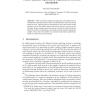128 search results - page 5 / 26 » Hierarchically Optimal Average Reward Reinforcement Learning |
NECO
2010
13 years 6 months ago
2010
Most conventional Policy Gradient Reinforcement Learning (PGRL) algorithms neglect (or do not explicitly make use of) a term in the average reward gradient with respect to the pol...
GECCO
2011
Springer
12 years 11 months ago
2011
Springer
The reward functions that drive reinforcement learning systems are generally derived directly from the descriptions of the problems that the systems are being used to solve. In so...
ICML
1998
IEEE
14 years 8 months ago
1998
IEEE
This paper presents a new approach to hierarchical reinforcement learning based on the MAXQ decomposition of the value function. The MAXQ decomposition has both a procedural seman...
CORR
2006
Springer
13 years 7 months ago
2006
Springer
While in general trading off exploration and exploitation in reinforcement learning is hard, under some formulations relatively simple solutions exist. Optimal decision thresholds ...
ICML
2006
IEEE
14 years 8 months ago
2006
IEEE
How should a reinforcement learning agent act if its sole purpose is to efficiently learn an optimal policy for later use? In other words, how should it explore, to be able to exp...

